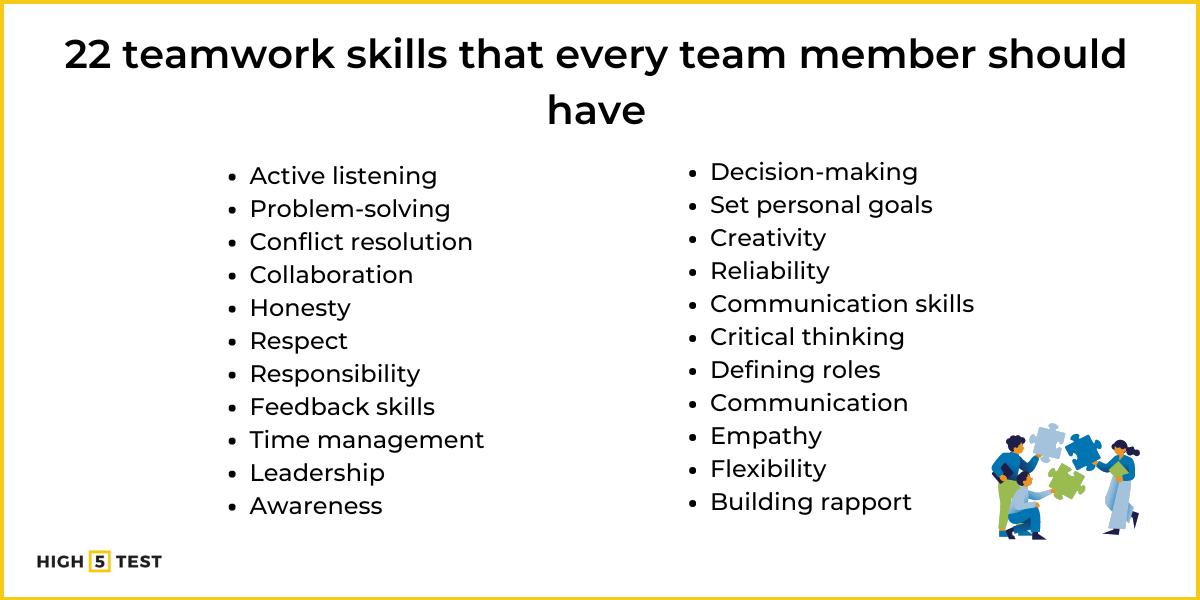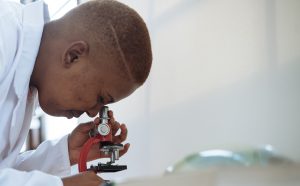Teamwork skills become glaringly apparent when we find ourselves part of an underperforming team. In such situations, the value of understanding and leveraging individual strengths within a team context cannot be overstated. Our HIGH5 strengths assessment can boost your teamwork skills across the board. By providing deep insights into each team member’s unique strengths, HIGH5 enables your team to perform at their best and reduce any potential dysfunctions.
Most times, communicating effectively seems impossible, everyone is confused, and the initially set goals are far from being achieved. This often leads to conflicts in the workplace and poor-quality outcomes. The truth is, working with other people isn’t as straightforward as working by ourselves. However, developing and improving your teamwork skills will not only make it much easier to work with your current team, but it will also make your resume shine amongst other candidates when applying for a new job. In this article, we’ll go in-depth about teamwork skills, including their definition, the different types, and how you can improve these key skills.
What are teamwork skills?
Teamwork skills encompass a range of soft skills that enable efficient collaboration in group settings. Identifying these skills is crucial for personal and professional development. The HIGH5 strengths test offers a comprehensive assessment that helps individuals recognize their unique teamwork strengths, such as communication, problem-solving, or leadership. Through your personal strengths profile, see how you can add to team dynamics and improve overall group performance.
Those include both basic social skills, and more specifically, teamwork. Some examples of teamwork skills are active listening, critical thinking, organization, the ability to give honest feedback, and task delegation. Being intrinsically motivated, having a personal preference for working in teams, and having a collective approach rather than an individualist one are also highly desirable attributes. Besides, having average-to-high levels of Big Five’s extraversion, agreeableness, and conscientiousness personality traits is best for teamwork.
Pro Tip From HIGH5
Leverage your identified strengths to enhance your teamwork skills. If the HIGH5 test reveals you excel in communication, focus on taking on roles that allow you to facilitate team discussions or present group ideas.
Types of teamwork skills
Teamwork skills are diverse and refer to various learned abilities and even some personality traits of each individual. High extraversion, conscientiousness, and agreeableness are associated with successful teamwork outcomes [1]. A positive team dynamic is achieved when the entire team is collaborative and conflicts are readily solved. Here are some of the most valuable teamwork skills.
Communication
Open and supportive team communication is the number one key to success for teams. Having communication skills means you communicate clearly and efficiently, so the message, medium, and receiver are all taken into account.
- Listening skills
- Presentation skills
- Feedback sharing
- Responsiveness
- Conversational skills
Conflict management
Being able to manage conflict and solve problems while fostering positive and useful interactions are imperative interpersonal skills in teamwork. It’s also always great to look for appropriate win-win strategies that leave the entire team satisfied.
- Problem-solving skills
- Conflict management
- Logical argument
- Mediation
- Flexibility
- Solution-based thinking
- Consensus decision making
Active listening
Using your active listening skills lets the speaker know that you are attentive to what they’re saying and that you understand their message correctly. Active listening techniques that show you’re engaged in the conversation include:
- Clarifying questions
- Maintaining appropriate eye contact
- Being aware of non-verbal communication
- Summarizing and rephrasing
Interpersonal awareness
Interpersonal awareness refers to being conscious of your teammates’ reactions and attitudes and understanding why they behave the way they do. Paying attention to body language, tone of voice and facial expressions is crucial for a better understanding of verbal messages. Likewise, having a high level of emotional intelligence is a very desirable teamwork skill, as you constantly have to deal with other people and their idiosyncrasies.
- Attention to non-verbal cues
- High emotional intelligence
- Interpersonal skills
Collaboration
This is a critical teamwork skill. In order to achieve a common goal, teammates need to collaborate with each other. This means working together in a synergic manner and helping one another in a way that all team members’ weaknesses are covered and strengths are amplified.
- Synergy
- Offering support
- Complementary skills
Reliability
Teammates must be able to rely on one another for a team to work efficiently. This means you and your colleagues mutually trust each other to be capable of completing individual tasks and delivering quality work in a timely manner.
- Trustworthiness
- Commitment
- Responsibility
- Building rapport
Empathy
Qualities like empathy, altruism, patience, and tolerance can really facilitate working and maintaining good relationships with teammates. Offering support, accepting criticism, taking in negative feedback, and being able to deal with frustrations while maintaining a positive attitude are highly reputable skills.
- Warmth
- Friendliness
- Hearing concerns
- Open-minded
Organization
When leading a team, being organized and good at planning and coordinating are essential skills to have. Effectively delegating tasks, clarifying roles, and establishing fair workloads will lead to an overall better group performance. An organized team is a team that gets work done.
- Leadership skills
- Planning skills
- Time management skills
- Organizational skills
- Project management skills
- Goal setting
- Team building
22 important teamwork skills

Active listening
Involves paying full attention to the speaker, understanding their message, and providing thoughtful feedback. This skill fosters better communication and understanding within the team.
Problem-solving
The ability to identify issues and come up with effective solutions quickly. It’s crucial for overcoming obstacles and achieving team goals.
Conflict resolution
Handling disputes in a calm and constructive manner. Helps maintain a positive team environment and ensures that conflicts don’t hinder progress.
Collaboration
Working together towards a common goal by pooling skills and resources. Effective collaboration improves productivity and strengthens team bonds.
Honesty
Being truthful and transparent with team members. Builds trust and ensures clear communication, which is essential for teamwork.
Respect
Valuing others’ opinions, skills, and contributions. It creates a positive work environment and promotes open dialogue.
Responsibility
Taking ownership of tasks and being accountable for results. This promotes reliability and ensures that goals are met on time.
Feedback skills
Offering constructive criticism in a way that helps others grow. Encourages improvement and fosters open communication.
Time management
Prioritizing tasks and managing time effectively to meet deadlines. It helps ensure the team stays on track and completes projects efficiently.
Leadership
Guiding and motivating team members towards achieving goals. Effective leadership inspires and aligns the team’s efforts.
Awareness
Being conscious of your actions, emotions, and their impact on others. Promotes better interpersonal interactions and understanding within the team.
Decision-making
Making informed choices that consider the needs of the team and the project. Strong decision-making skills lead to quicker and better results.
Set personal goals
Create individual targets that align with team objectives. Helps team members stay motivated and focused on contributing to the team’s success.
Creativity
Bringing innovative ideas and solutions to the table. Creativity helps solve problems and brings fresh perspectives to teamwork.
Reliability
Being dependable in fulfilling commitments and tasks. Teams function smoothly when they can count on each other to deliver quality work.
Communication skills
Clearly and effectively conveying information to others. Ensures that messages are understood and helps prevent miscommunication.
Critical thinking
Analyzing situations logically and making well-informed decisions. It helps in navigating challenges and finding optimal solutions.
Defining roles
Assigning specific tasks and responsibilities to team members. This ensures accountability and helps avoid confusion or duplication of work.
Empathy
Understanding and sharing the feelings of teammates. Empathy fosters stronger relationships and promotes a supportive team culture.
Delegation
Ensuring every team member knows their responsibilities and tasks. This clarity boosts efficiency and minimizes overlaps or gaps in work.
Flexibility
The ability to adapt to changing situations and take on new challenges as they arise. Flexible team members are crucial for responding to unexpected obstacles.
Building rapport
Creating strong, positive relationships with team members. This enhances communication and cooperation, leading to a more cohesive team.
How can you improve your teamwork skills in the workplace?
Modern organizations are tending more and more to teams as their preferred work structures. This is because collaborative work, when high-performing, is known to increase overall product quality. Employers seek to hire applicants with good teamwork skills, which come in handy in almost any position. There are several ways you can develop and improve these soft skills. Outlined below are some steps you can take in that direction.
Use feedback
Obtaining objective and relevant feedback is crucial for identifying areas of improvement in your teamwork skills. While asking colleagues for their opinions is valuable, a more comprehensive approach is to use a scientifically-backed tool like the HIGH5 strengths assessment. Our test provides an in-depth analysis of your unique strengths, offering insights that may not be immediately apparent to your colleagues. Then, you can focus on your strengths in team settings and address potential blind spots to enhance your performance as a team player!
Use observational learning
Pay close attention to the co-workers you consider the most skilled in team working. Ask them for advice, and take note of their behaviors and attitudes, then seek to assimilate those into your own interactions with the group. You’ll be spontaneously improving your teamwork skills and even developing new ones.
Practice
Whether you want to improve hard skills or soft skills, it will not happen overnight. Practice makes it perfect and therefore, by participating more in teamwork and interacting with new colleagues, you’ll put your soft and hard skills to good use while consolidating them, as well as building rapport.
Goal setting
Setting specific and challenging yet reachable goals such as SMART goals [2] can be a strong tactic to keep you and your team motivated and goal-oriented. Let your colleagues’ feedback guide your goal setting and achievement, but don’t forget to self-monitor, as that’s also an important skill to have.
Importance of using the team’s strengths
The strengths theory, which forms the foundation of the HIGH5 approach, posits that individuals are more likely to thrive when they focus on their innate abilities and qualities rather than their vulnerabilities. This principle is particularly crucial in team settings, where diverse strengths can synergize to create high-performing units. By using the HIGH5 strengths assessment, team members can gain a deep understanding of their unique strengths profile.
This self-awareness allows individuals to contribute more effectively to the team. If everyone works alongside their strengths, they’re bringing the best parts of themselves into the team and helping performance levels stay high. Listed below are some actions you can take that can promote strengths in teams:
- Highlight skills and strengths rather than gaps
- Select team members with complementary strengths
- Offer support to your teammates
- Work together if your strengths align
- Give strength-focused feedback
- Recognize your colleagues’ achievements
Pro Tip From HIGH5
Organize a team session where each member shares their top strengths identified by the HIGH5 test. This exercise can help the team understand how to best leverage each person’s unique abilities and create more effective collaboration strategies.
Team building with the Belbin team roles
Even if you have excellent teamwork skills, you won’t go far if you’re part of a badly assembled team. It’s true that skilled team members with good interpersonal skills constitute the building blocks of great, functional teams. Thoughtful team building (which is a skill itself) is crucial if you want to form an efficient workgroup. Successful team building is a complex process. However, employing the Belbin Team Roles framework builds better teams. Belbin’s theory is based on the premise that in order for a team to be effective, certain key roles must be fulfilled.
Team members’ strengths and weaknesses are assessed through a self-perception inventory, and the results place each in their best-fit role. Three distinct categories – social, thinking, and action – branch out to a total of nine Belbin Team Roles, which are each correlated with Big Five dimensions.
SOCIAL ROLES
Teamworker – a versatile and collaborative team player who is responsive to their team members’ needs while making sure the team remains cohesive with their diplomatic character.
Coordinator – a person-oriented and confident leader with powerful delegation skills who assigns tasks and sets concrete goals for the team.
Resource Investigator – a curious and innovative people-person who develops useful contacts and explores new opportunities.
THINKING ROLES
Plant – a highly creative and ingenious person responsible for generating new ideas and has good problem-solving and presentation skills.
Monitor Evaluator – a judicious person who monitors the team performance and who can make unbiased assessments of colleagues and their work.
Specialist – a dedicated person who contributes with their expertise and knowledge to the team, helping with technicalities related to their field.
ACTION ROLES
Shaper – a goal-oriented person who is dynamic and driven, responsible for keeping the team focused and motivated.
Implementer – a highly practical and organized person who can efficiently turn ideas into actions thanks to their strategic and logical skills.
Completer Finisher – a meticulous and detail-oriented person who is responsible for fine-tuning and making sure the final output is free of errors.
Strengths-based perspective on teamwork
A team, by definition, is a group of individuals working interdependently, each bringing their unique set of strengths to the table. The HIGH5 strengths assessment takes this concept further by providing a detailed analysis of each team member’s top strengths. This insight allows teams to strategically assign roles and tasks based on individual strengths, leading to increased engagement and productivity.
For instance, a team member identified as having strong analytical skills through the HIGH5 test might be best suited for data-driven tasks, while someone with high empathy could excel in client-facing roles. By aligning tasks with innate strengths, teams can optimize their collective performance and achieve superior results. It’s through a mix of these complementary, individual strengths, that performance is boosted and team goals are achieved. If you take a closer look back at Belbin’s team roles, you’ll see they’re each based on different strengths, along with allowable weaknesses [3].
Social roles
Teamworker
- Strengths: Co-operative, diplomatic and perceptive.
- Areas for improvement: Avoids confrontation and is sometimes indecisive.
Coordinator
- Strengths: Mature, confident and able to identify talent.
- Areas for improvement: Can be seen as manipulative and might offload their own share of work.
Resource Investigator
- Strengths: Outgoing and enthusiastic.
- Areas for improvement: Can be over-optimistic and can easily lose interest.
Thinking roles
Plant
- Strengths: Creative, imaginative, outside-the-box thinking.
- Allowable weaknesses: Ignoring incidentals and not being able to communicate effectively.
Monitor Evaluator
- Strengths: Strategic, sober and discerning.
- Allowable weaknesses: Lacking the drive and ability to inspire others and being overly critical.
Specialist
- Strengths: Dedicated, single-minded and self-starting
- Allowable weaknesses: Contributes on a narrow front and dwells on technicalities.
Action roles
Shaper
- Strengths: Challenging, dynamic and thrives on pressure.
- Allowable weaknesses: Might be prone to provocation and may offend.
Implementer
- Strengths: Reliable, practical and efficient.
- Allowable weaknesses: Can be inflexible and wary of new opportunities.
Completer Finisher
- Strengths: Painstaking, anxious and conscientious.
- Allowable weaknesses: Reluctant to delegate and worries excessively.
Pro Tip From HIGH5
Use the results of your team’s HIGH5 assessments to create a ‘Strength Map’ for your projects. This visual representation can help in task allocation and ensure that each team member is working in areas where they can make the most significant impact.
How to highlight teamwork skills on your resume?
When it comes to applying for a new job, you always want to make a good first impression. A well-written resume that is specific, concise and that highlights your best qualities is a good way to do that. When including your teamwork skills on your resume or cover letter, keep in mind to:
Tailor your resume
Always tailor your resume to the job you’re applying to. Keep relevant skills, and leave out unrelated ones. Also, emphasize the required job skills. Keep your resume short, easy to read, and specific to the particular position you’re applying to. Ideally, it should be one to two pages long, as recruiters on average take fewer than 10 seconds to scan through it [4].
Quantify your achievements
Describing your teamwork skills by giving out examples, such as past achievements and life experience, is like proving to the recruiter that you do, indeed, own all those skills. Be concrete and describe them using quantifiable results, if it applies. Giving out these examples, in which you revealed those particular skills, also shows you have confidence in your work and abilities.
Teamwork skills FAQ
How would you describe your teamwork skills?
Teamwork skills can be described using multiple strategies. One way to describe them is to get specific. Ask yourself which specific skills are you referring to or learning more about. For instance, you could focus on communication, empathy, and leadership. To describe how well you use that skill, try asking your employees or colleagues. Keep track of which results you produce to further quantify your leadership skills.
What are the 3 important skills for teamwork and collaboration?
In general, there are 3 important skills that you need to keep in mind when working in a team. These 3 skills are trust, tolerance, and self-awareness. Trust is the basis of every relationship. Without trust, your colleagues may be unwilling to work with you. Tolerance is necessary because it allows you to put aside prejudice so you can work together for a common goal. Self-awareness is important as it helps you effectively delegate tasks based on skills and strengths. It makes you more receptive to feedback, too.
What are the 7 elements of teamwork?
The seven elements of teamwork are:
- Communication
- Trust
- Collaboration
- Respect
- Accountability
- Adaptability
- Shared goals.
These ensure a cohesive, efficient dynamic where each member works towards team goals.
Recap of teamwork skills
Teamwork skills are highly valued for increasing group performance and outcome quality. Therefore, most employers seek to hire applicants with strong teamwork skills for building their teams. This is why you should focus on improving these key skills. Take in constructive feedback, learn by observing, set personal goals, and practice your collaborative abilities. For a team to be successful, the team members’ individual strengths must complement each other well, which is why thoughtful team building is so important.
References
- Curşeu, P. L., Ilies, R., Vîrgă, D., Maricuţoiu, L., & Sava, F. A. (2019). Personality characteristics that are valued in teams: Not always “more is better”?. International journal of psychology: Journal international de psychologie, 54(5), 638–649. https://doi.org/10.1002/ijop.12511.
- Campbell, J. (2023, April 30). What Stops Us From Achieving Our Goals. Harvard Business Review. https://hbr.org/2023/05/what-stops-us-from-achieving-our-goals.
- Belbin. (2024). The Nine Belbin Team Roles. Belbin. https://www.belbin.com/about/belbin-team-roles.
- Cohen, P. (2022, May 23). How to Write a Resume That Stands Out. Harvard Business Review. https://hbr.org/2022/05/how-to-write-a-resume-that-will-stand-out.







